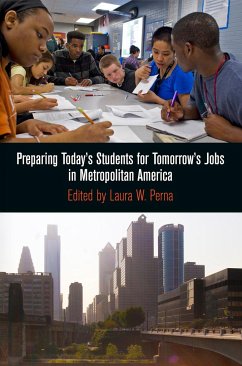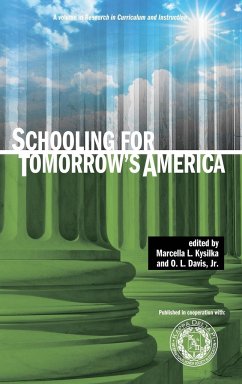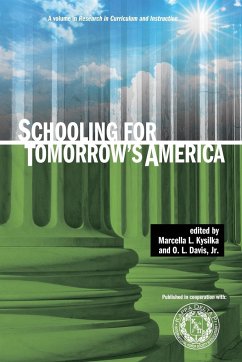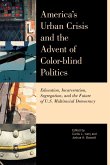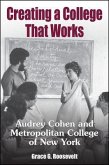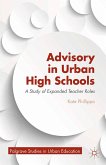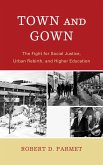Preparing Today's Students for Tomorrow's Jobs in Metropolitan America
Herausgeber: Perna, Laura W
Preparing Today's Students for Tomorrow's Jobs in Metropolitan America
Herausgeber: Perna, Laura W
- Gebundenes Buch
- Merkliste
- Auf die Merkliste
- Bewerten Bewerten
- Teilen
- Produkt teilen
- Produkterinnerung
- Produkterinnerung
Laura W. Perna is Professor in the Graduate School of Education at the University of Pennsylvania and editor of Understanding the Working College Student: New Research and Its Implications for Policy and Practice.
Andere Kunden interessierten sich auch für
![Today's Dreams, Tomorrow's Realities Today's Dreams, Tomorrow's Realities]() Syntha Traughber WestToday's Dreams, Tomorrow's Realities17,99 €
Syntha Traughber WestToday's Dreams, Tomorrow's Realities17,99 €![Schooling for Tomorrow's America (Hc) Schooling for Tomorrow's America (Hc)]() Schooling for Tomorrow's America (Hc)109,99 €
Schooling for Tomorrow's America (Hc)109,99 €![Schooling for Tomorrow's America Schooling for Tomorrow's America]() Schooling for Tomorrow's America64,99 €
Schooling for Tomorrow's America64,99 €![America's Urban Crisis and the Advent of Color-Blind Politics America's Urban Crisis and the Advent of Color-Blind Politics]() America's Urban Crisis and the Advent of Color-Blind Politics117,99 €
America's Urban Crisis and the Advent of Color-Blind Politics117,99 €![Creating a College That Works: Audrey Cohen and Metropolitan College of New York Creating a College That Works: Audrey Cohen and Metropolitan College of New York]() Grace G. RooseveltCreating a College That Works: Audrey Cohen and Metropolitan College of New York109,99 €
Grace G. RooseveltCreating a College That Works: Audrey Cohen and Metropolitan College of New York109,99 €![Advisory in Urban High Schools Advisory in Urban High Schools]() K. PhillippoAdvisory in Urban High Schools48,99 €
K. PhillippoAdvisory in Urban High Schools48,99 €![Town and Gown Town and Gown]() Robert D ParmetTown and Gown125,99 €
Robert D ParmetTown and Gown125,99 €-
-
-
Laura W. Perna is Professor in the Graduate School of Education at the University of Pennsylvania and editor of Understanding the Working College Student: New Research and Its Implications for Policy and Practice.
Hinweis: Dieser Artikel kann nur an eine deutsche Lieferadresse ausgeliefert werden.
Hinweis: Dieser Artikel kann nur an eine deutsche Lieferadresse ausgeliefert werden.
Produktdetails
- Produktdetails
- Verlag: University of Pennsylvania Press
- Seitenzahl: 344
- Erscheinungstermin: 17. Dezember 2012
- Englisch
- Abmessung: 236mm x 163mm x 33mm
- Gewicht: 703g
- ISBN-13: 9780812244533
- ISBN-10: 0812244532
- Artikelnr.: 35564324
- Herstellerkennzeichnung
- Libri GmbH
- Europaallee 1
- 36244 Bad Hersfeld
- gpsr@libri.de
- Verlag: University of Pennsylvania Press
- Seitenzahl: 344
- Erscheinungstermin: 17. Dezember 2012
- Englisch
- Abmessung: 236mm x 163mm x 33mm
- Gewicht: 703g
- ISBN-13: 9780812244533
- ISBN-10: 0812244532
- Artikelnr.: 35564324
- Herstellerkennzeichnung
- Libri GmbH
- Europaallee 1
- 36244 Bad Hersfeld
- gpsr@libri.de
Edited by Laura W. Perna
Introduction
—Laura W. Perna
I. DEFINING SUCCESS IN PREPARING INDIVIDUALS FOR WORK
Chapter 1. Tinker, Tailor, Soldier, Sailor: A Public Policy Agenda for
Today's Students and Tomorrow's Jobs
—Alan Ruby
Chapter 2. Assessing and Measuring Workforce Readiness: Toward the
Development of a Universal and Valid Measure
—Katherine M. Barghaus, Eric T. Bradlow, Jennifer McMaken, and Samuel H.
Rikoon
Chapter 3. Work-Based Learning: Initiatives and Impact
—Bridget N. O'Connor
II. THE ROLE OF DIFFERENT EDUCATIONAL PROVIDERS IN PREPARING STUDENTS FOR
WORK
Chapter 4. Improving Career and Technical Education in the United States
—Nancy Hoffman
Chapter 5. Postsecondary Education and Economic Opportunity
—Anthony P. Carnevale, Nicole Smith, and Jeff Strohl
Chapter 6. Community College Occupational Degrees: Are They Worth It?
—Thomas Bailey and Clive R. Belfield
Chapter 7. The Conundrum of Profit-Making Institutions in Higher Education
—William G. Tierney
III. IMPLICATIONS FOR INSTITUTIONAL PRACTICE AND PUBLIC POLICY
Chapter 8. Strengthening the Education and Workforce Connection: What Types
of Research Are Required to Determine How Well Career Pathways Programs
Prepare Students for College and Careers?
—Lashawn Richburg-Hayes, Michael Armijo, and Lisa Merrill
Chapter 9. Conceiving Regional Pathways to Prosperity Systems
—Ronald F. Ferguson
Chapter 10. Aligning Secondary and Postsecondary Credentialization with
Economic Development Strategy, or If Low Educational Attainment = Poor
Metropolitan Competitiveness, What Can Be Done About It?
—Laura Wolf-Powers and Stuart Andreason
Chapter 11. Creating Effective Education and Workforce Policies for
Metropolitan Labor Markets in the United States
—Harry J. Holzer
Conclusion
—Laura W. Perna
Notes
List of References
List of Contributors
Index
Acknowledgments
—Laura W. Perna
I. DEFINING SUCCESS IN PREPARING INDIVIDUALS FOR WORK
Chapter 1. Tinker, Tailor, Soldier, Sailor: A Public Policy Agenda for
Today's Students and Tomorrow's Jobs
—Alan Ruby
Chapter 2. Assessing and Measuring Workforce Readiness: Toward the
Development of a Universal and Valid Measure
—Katherine M. Barghaus, Eric T. Bradlow, Jennifer McMaken, and Samuel H.
Rikoon
Chapter 3. Work-Based Learning: Initiatives and Impact
—Bridget N. O'Connor
II. THE ROLE OF DIFFERENT EDUCATIONAL PROVIDERS IN PREPARING STUDENTS FOR
WORK
Chapter 4. Improving Career and Technical Education in the United States
—Nancy Hoffman
Chapter 5. Postsecondary Education and Economic Opportunity
—Anthony P. Carnevale, Nicole Smith, and Jeff Strohl
Chapter 6. Community College Occupational Degrees: Are They Worth It?
—Thomas Bailey and Clive R. Belfield
Chapter 7. The Conundrum of Profit-Making Institutions in Higher Education
—William G. Tierney
III. IMPLICATIONS FOR INSTITUTIONAL PRACTICE AND PUBLIC POLICY
Chapter 8. Strengthening the Education and Workforce Connection: What Types
of Research Are Required to Determine How Well Career Pathways Programs
Prepare Students for College and Careers?
—Lashawn Richburg-Hayes, Michael Armijo, and Lisa Merrill
Chapter 9. Conceiving Regional Pathways to Prosperity Systems
—Ronald F. Ferguson
Chapter 10. Aligning Secondary and Postsecondary Credentialization with
Economic Development Strategy, or If Low Educational Attainment = Poor
Metropolitan Competitiveness, What Can Be Done About It?
—Laura Wolf-Powers and Stuart Andreason
Chapter 11. Creating Effective Education and Workforce Policies for
Metropolitan Labor Markets in the United States
—Harry J. Holzer
Conclusion
—Laura W. Perna
Notes
List of References
List of Contributors
Index
Acknowledgments
Introduction
—Laura W. Perna
I. DEFINING SUCCESS IN PREPARING INDIVIDUALS FOR WORK
Chapter 1. Tinker, Tailor, Soldier, Sailor: A Public Policy Agenda for
Today's Students and Tomorrow's Jobs
—Alan Ruby
Chapter 2. Assessing and Measuring Workforce Readiness: Toward the
Development of a Universal and Valid Measure
—Katherine M. Barghaus, Eric T. Bradlow, Jennifer McMaken, and Samuel H.
Rikoon
Chapter 3. Work-Based Learning: Initiatives and Impact
—Bridget N. O'Connor
II. THE ROLE OF DIFFERENT EDUCATIONAL PROVIDERS IN PREPARING STUDENTS FOR
WORK
Chapter 4. Improving Career and Technical Education in the United States
—Nancy Hoffman
Chapter 5. Postsecondary Education and Economic Opportunity
—Anthony P. Carnevale, Nicole Smith, and Jeff Strohl
Chapter 6. Community College Occupational Degrees: Are They Worth It?
—Thomas Bailey and Clive R. Belfield
Chapter 7. The Conundrum of Profit-Making Institutions in Higher Education
—William G. Tierney
III. IMPLICATIONS FOR INSTITUTIONAL PRACTICE AND PUBLIC POLICY
Chapter 8. Strengthening the Education and Workforce Connection: What Types
of Research Are Required to Determine How Well Career Pathways Programs
Prepare Students for College and Careers?
—Lashawn Richburg-Hayes, Michael Armijo, and Lisa Merrill
Chapter 9. Conceiving Regional Pathways to Prosperity Systems
—Ronald F. Ferguson
Chapter 10. Aligning Secondary and Postsecondary Credentialization with
Economic Development Strategy, or If Low Educational Attainment = Poor
Metropolitan Competitiveness, What Can Be Done About It?
—Laura Wolf-Powers and Stuart Andreason
Chapter 11. Creating Effective Education and Workforce Policies for
Metropolitan Labor Markets in the United States
—Harry J. Holzer
Conclusion
—Laura W. Perna
Notes
List of References
List of Contributors
Index
Acknowledgments
—Laura W. Perna
I. DEFINING SUCCESS IN PREPARING INDIVIDUALS FOR WORK
Chapter 1. Tinker, Tailor, Soldier, Sailor: A Public Policy Agenda for
Today's Students and Tomorrow's Jobs
—Alan Ruby
Chapter 2. Assessing and Measuring Workforce Readiness: Toward the
Development of a Universal and Valid Measure
—Katherine M. Barghaus, Eric T. Bradlow, Jennifer McMaken, and Samuel H.
Rikoon
Chapter 3. Work-Based Learning: Initiatives and Impact
—Bridget N. O'Connor
II. THE ROLE OF DIFFERENT EDUCATIONAL PROVIDERS IN PREPARING STUDENTS FOR
WORK
Chapter 4. Improving Career and Technical Education in the United States
—Nancy Hoffman
Chapter 5. Postsecondary Education and Economic Opportunity
—Anthony P. Carnevale, Nicole Smith, and Jeff Strohl
Chapter 6. Community College Occupational Degrees: Are They Worth It?
—Thomas Bailey and Clive R. Belfield
Chapter 7. The Conundrum of Profit-Making Institutions in Higher Education
—William G. Tierney
III. IMPLICATIONS FOR INSTITUTIONAL PRACTICE AND PUBLIC POLICY
Chapter 8. Strengthening the Education and Workforce Connection: What Types
of Research Are Required to Determine How Well Career Pathways Programs
Prepare Students for College and Careers?
—Lashawn Richburg-Hayes, Michael Armijo, and Lisa Merrill
Chapter 9. Conceiving Regional Pathways to Prosperity Systems
—Ronald F. Ferguson
Chapter 10. Aligning Secondary and Postsecondary Credentialization with
Economic Development Strategy, or If Low Educational Attainment = Poor
Metropolitan Competitiveness, What Can Be Done About It?
—Laura Wolf-Powers and Stuart Andreason
Chapter 11. Creating Effective Education and Workforce Policies for
Metropolitan Labor Markets in the United States
—Harry J. Holzer
Conclusion
—Laura W. Perna
Notes
List of References
List of Contributors
Index
Acknowledgments

